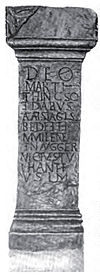Bede (goddess)
Bede is the name of a Germanic deity , which is only attested by an inscription from northern England.
In an inscription found in Housesteads ( Vercovicium ) on Hadrian's Wall on a votive stone from the 2nd century, she is named as one of the Alaisiagae together with the goddess Fimmilena as the companion of the god Mars Thincsus, who is honored with the inscription . The following inscription was probably made by a Roman auxiliary unit , the Cuneus Frisiorum Vercovicianorum :
"Deo / Marti / Thincso / et duabus / Alaisiagis / Bede et Fi / mmilene / et N (umini) Aug (usti) Ger / m (ani) cives Tu / ihanti / v (otum) s (olverunt) l (ibentes) m (erito). "
"To the god Mars Thincsus and the two Alais Beda and Fimmilena and to the divinity of the emperor, the Teutons from the tribe of the Tuihanten, who willingly and gladly fulfilled their oath."
Since Mars Thincsus is mostly interpreted in research as the god of things , i.e. the people's and court assemblies , and the founders were Frisians in Roman legionary services, an attempt is made to interpret the name and function of the Bede from this context.
Early on after the first scientific description of the inscription at the end of the 19th century , the names Beda and Fimmilena were associated with the legal institutions of Bodthing and Fimelthing , which are mentioned in the West Frisian Schulzenrecht of the 12th century. Bodthing appears here as a "required thing", fimelthing as an additional afterding or disobedient thing . According to Georges Dumézil and Rudolf Simek , Beda would therefore be the (protective) goddess of bedthings . The time lag between the Roman era and the late medieval sources is considerable. The Norwegian historian Frode Iversen therefore warns against jumping to conclusions, but believes the names of gods mentioned could actually indicate the existence of a Germanic system of fixed legal assemblies ( Thincsus ), with special sessions ( Beda ) and informal sessions ( Fimmilena ).
literature
- Willem van Helten: About Marti Thincso, Alaisiages Bede et Fimmilene (?), Tuihanti, (longob.) Thinx, (Got.) Þeis and (left.) Dinxen-, Dijssendach etc., (mnd.) Dingsedach. In: Contributions to the history of German language and literature 27, 1902, pp. 137–153 ( Textarchiv - Internet Archive ).
- Frode Iversen: Concilium and Pagus - Revisiting the Early Germanic Thing System of Northern Europe. In: Journal of the North Atlantic. Special Volume 5, 2013, pp. 5-17.
- Rudolf Simek : Lexicon of Germanic Mythology (= Kröner's pocket edition . Volume 368). 3rd, completely revised edition. Kröner, Stuttgart 2006, ISBN 3-520-36803-X , pp. 7-8, 44, 117, 265-266.
Remarks
- ^ RIB 1593
- ↑ Botding . In: Prussian Academy of Sciences (Hrsg.): German legal dictionary . tape 2 , issue 3 (edited by Eberhard von Künßberg ). Hermann Böhlaus successor, Weimar, Sp. 425 ( adw.uni-heidelberg.de - publication date 1932 or 1933).
- ↑ Fimmelding . In: Prussian Academy of Sciences (Hrsg.): German legal dictionary . tape 3 , issue 4 (edited by Eberhard von Künßberg ). Hermann Böhlaus successor, Weimar, Sp. 537 ( adw.uni-heidelberg.de - publication date between 1935 and 1938).
